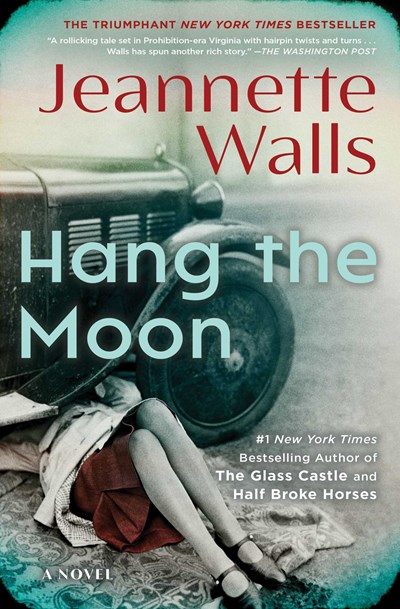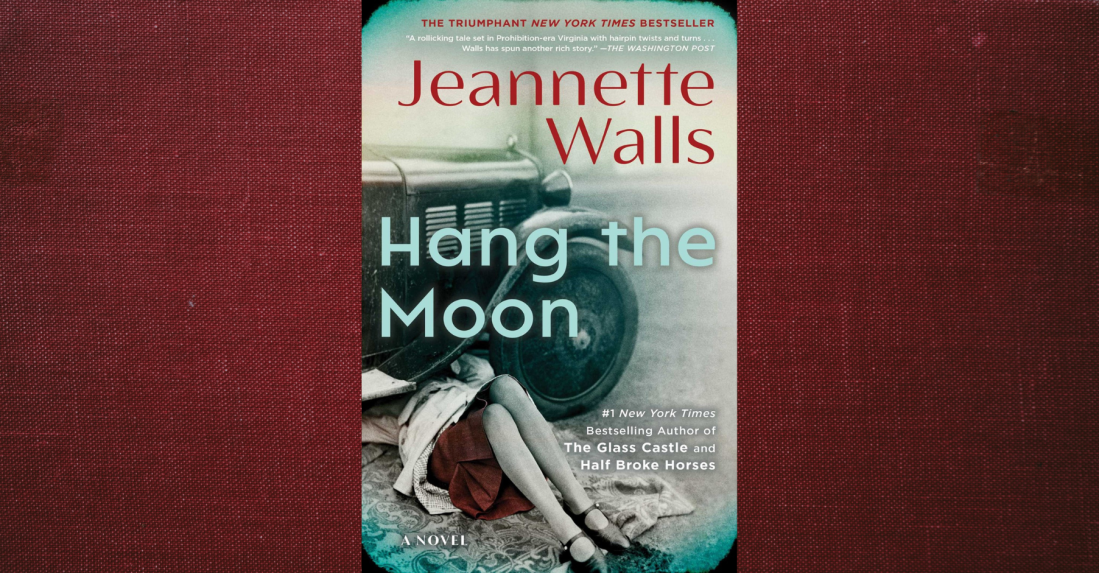The U.S. South is not particularly safe for women. According to a recent Newsweek article, Louisiana has one of the highest rates of men murdering women. Arkansas and West Virginia have among the highest incidences of domestic violence. And, in a review published by the Violence Policy Center, South Carolina consistently ranks as one of the most dangerous states for women.
Threats against women, however, are not new, nor are they confined to the states that make a think tank top-ten list. They are entrenched. In Jeannette Walls’ dazzling novel Hang the Moon, for instance, post-Civil War Virginia is anything but kind to women, especially women like Sallie Kincaid, the novel’s narrator.
Sallie is the daughter of The Duke, a prominent Southern businessman whose sociopolitical and economic influence extends into Richmond. Set during the early 1900s and the Prohibition years, the novel depicts Sallie’s rise to influence and power in the small town of Caywood after she returns to the family estate from what is basically exile. Her stepmother, Jane, had forced Sallie’s father to send Sallie to her Aunt Faye’s because Jane believed Sallie intentionally wrecked a coaster wagon to kill her half-brother, Eddie. It is this exile — during which Sallie grew up and lived in the nearby town of Hayfield — that profoundly shapes Sallie’s outlook about Virginia, the world, education, and women’s rights.
In Hayfield Sallie watches as her Aunt Faye, beaten and bruised by male customers, returns home from work at a local roadside establishment. Despite Sallie’s aptitudes, and despite her desire to rise above the common expectations of Southern women at the time, Sallie is forced to reconcile with the fact that because she is a female, she cannot take over the family business or hold political office.
Reproductive rights are a subtle theme in Hang the Moon. Sallie is progressive for her time in her advocacy for and use of protection during sexual intercourse. However, other women — with whom men casually have their way — are not so vocal or fortunate. The prime example of this is Nell, the maid at Sallie’s family estate, who finds herself impregnated by Sallie’s intended, Rawley. The revelation naturally changes the course of Sallie’s marital intentions, and Sallie makes a bold move: she tells Rawley at gunpoint that he should marry Nell. Rawley insists that the easiest solution is to send Nell away so that she can have the child — a common practice for unmarried, pregnant women at the time. But, after Rawley rejects Sallie’s demands, she tells him to leave — which he does — and Sallie decides to help Nell raise her child in the family home without him.
Rawley, like The Duke, represents the worst of Southern toxic masculinity. Over time, as the women in Sallie’s life confide in her, Sallie discovers that her father was a philanderer, an abuser, and, most likely, a murderer. To The Duke, women were expendable, and violence and dominance were acceptable means of keeping women subjugated. Rawley, in many ways, is a reflection of The Duke, despite coming from an entirely different socioeconomic status. Rawley, too, regards women as expendable objects to be traded, swapped, or abandoned. When he decides to abandon Nell, and ultimately Sallie, readers see his true character, which is a complete foil to the Rawley readers initially met in the novel.
Sallie’s character also introduces another especially progressive question for women of her era: Is marriage really necessary? Initially, it is The Duke who tells Sallie that she should begin preparing for marriage. Sallie resists. After her father’s death, Sallie inherits the family business (which turns out to be bootlegging), and her father’s most trusted advisor suggests that Sallie should marry. However, Sallie remains leery, and critical, of marriage. She recognizes that marriage would mean an entirely different role for her in her family’s business, and even though she initially accepts a proposal from Rawley, she insists that she remain at the business’ forefront. It is Sally’s longtime friend, Tom Dunbar, who finally admits what others around Sallie cannot: “Sallie Kincaid, I will always love you, but I don’t know if you’ll ever come around to the idea of being someone’s wife.” Tom’s recognition is actually a statement of empowerment, and in it, readers recognize that Tom Dunbar is one of the few male characters in the book willing to look beyond traditional gender expectations to help Sallie form a better future.
Sallie Kincaid’s Virginia is, thankfully, not today’s Virginia, which is the only Southern refuge for abortion rights. But there are parallels. Statistics from the Institute for Women’s Policy Research project, Status of Women in the States, show that modern-day Virginia scores a D- on women’s political participation, a D- on work and family, and a C- on reproductive rights. As more and more states attack women’s rights, it’s not inconceivable that Virginia, too, may one day join its Southern neighbors.
Walls’ novel is more than just a good story about a female bootlegger who can drive well. It includes historical examples of a patriarchy that has far from disappeared. This patriarchy has merely reshaped and recalibrated itself, and the misogyny it propagates still sounds loudly in certain political spheres and policies. Hang the Moon reinforces why women everywhere must continue to take a stand for their livelihoods, their autonomy, and their bodies. Sallie is an inspiration, a new kind of heroine straight from the past, whose bravery and resilience women can model today.

Hang the Moon
By Jeannette Walls
Scribner
Paperback published March 26, 2024

